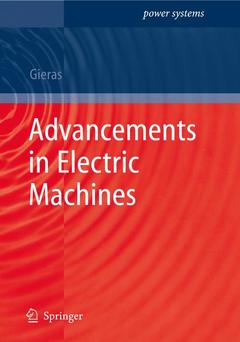Description
Advancements in Electric Machines, Softcover reprint of hardcover 1st ed. 2009
Power Systems Series
Language: English
Keywords
Generator; Motor; PMBM; Propeller; Radar; electric motor; electrical machines; mechatronics; power engineering
Advancements in Electric Machines
Publication date: 10-2010
278 p. · 15.5x23.5 cm · Paperback
Publication date: 10-2010
278 p. · 15.5x23.5 cm · Paperback
Advancements in Electric Machines
Publication date: 11-2008
278 p. · 15.5x23.5 cm · Hardback
Publication date: 11-2008
278 p. · 15.5x23.5 cm · Hardback
Description
/li>Contents
/li>Comment
/li>
Traditionally, electrical machines are classi?ed into d. c. commutator (brushed) machines, induction (asynchronous) machines and synchronous machines. These three types of electrical machines are still regarded in many academic curricula as fundamental types, despite that d. c. brushed machines (except small machines) have been gradually abandoned and PM brushless machines (PMBM) and switched reluctance machines (SRM) have been in mass p- duction and use for at least two decades. Recently, new topologies of high torque density motors, high speed motors, integrated motor drives and special motors have been developed. Progress in electric machines technology is stimulated by new materials, new areas of applications, impact of power electronics, need for energy saving and new technological challenges. The development of electric machines in the next few years will mostly be stimulated by computer hardware, residential and public applications and transportation systems (land, sea and air). At many Universities teaching and research strategy oriented towards el- trical machinery is not up to date and has not been changed in some co- tries almost since the end of the WWII. In spite of many excellent academic research achievements, the academia?industry collaboration and technology transfer are underestimated or, quite often, neglected. Underestimation of the role of industry, unfamiliarity with new trends and restraint from technology transfer results, with time, in lack of external ?nancial support and drastic - cline in the number of students interested in Power Electrical Engineering.
Material engineering.- High power density machines.- High speed machines.- Other types of novel motors.- Electric motors for medical and clinical applications.- Generators for portable power applications.- Superconducting electric machines.- Naval electric machines.- Scenario for nearest future.
No book on advancements in electric machines has been published so far Trends and future development of electric machines are predicted
© 2024 LAVOISIER S.A.S.

